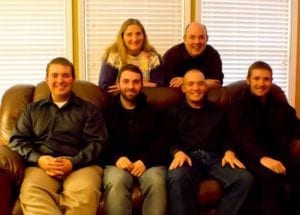Unknown origins of birth. Overcoming enormous personal obstacles at an early age. A mysterious medical diagnosis. Making a drastic new change in life.
This could – and is! – a subject of a great novel, but it’s also the real-life story of Gary McPherson, who at 52 ventured into the world of fiction writing for the first time in great part because of his experience battling Behçet’s Disease.
Like Gary’s protagonist Joshua in his book “Joshua and the Shadow of Death,” Gary himself has had an unconventional life because of the journey of suffering, diagnosis, and managing a rare disease.
Behçet’s disease, also known as Behçet’s syndrome, is a chronic condition that causes chronic inflammation which manifests as ulcers (commonly referred to as canker sores). It occurs primarily in Asia and the Middle East. These ulcers most often appear in the mouth and on the genitals. Inflammation also commonly affects the eye and skin. Sometimes, this inflammation attacks the joints, and, in rare cases, the digestive system, brain, and/or spinal cord.
To learn more about Behçet’s, click here!

You might be thinking – how does a guy named Gary McPherson have a genetic disease that occurs in Asia and the Middle East. And you’d be right to do so!
Like any good piece of fiction – the origin story is key here. Gary was adopted – and it turns out his birth parents were native to Europe; one of whom was a carrier of Behçet’s.
I found information about my birth mother, who hails from Denmark, but was unable to locate material about my birth father. I turned to genome mapping. The doctors needed to know my paternal side and so they submitted my blood for genome mapping and discovered that there were Turkish markers in my genes.
And in true dramatic fashion, the first sign of the Behçet’s showed about 9 weeks into Gary’s life – in the form of sores. As a baby, the first signs were crops of sores in his throat and mouth. They were so thick, he couldn’t take his formula. Doctors concluded he must have inherited herpes.
Crops of mouth and throat sores continued up until my official diagnoses in my thirties. On the upside it did help keep my weight down. When you are unable to eat due to pain it makes losing weight a breeze. Of course, now that I have a proper diagnosis, and there is better medication, I am able to eat on a regular basis. I’m finding my hundred and ninety-five pounds on my five-foot-eight-inch frame quite comfortable, despite what my doctor keeps telling me.
It would be one of many misdiagnoses/misreadings of his Behçet’s!
In fact, Gary’s pre-Behçet’s diagnosis life was riddled with some incredible obstacles and plot-twists – like a doctor concluding he may have HIV/AIDS because of an extremely high white blood cell count, his father resorting to putting Gary into a headlock to burst sores-turned-blisters in his mouth, being told he has only 5 years to live at one point and having to explain to his new wife about a sudden flare-up of genital sores.
Gary has been through the ringer!
One of the more standout tribulations however was when his eyesight was deteriorating because of uveitis, caused by his immune system attacking his retina. In fact, his doctor told him he would go blind quite soon.
Gary, ever the comical pragmatist, dealt with it the only way he could:
I love messing with people’s heads, so I got a lot of enjoyment listening to people’s reaction when I would make a blind joke. I still smile thinking about how people would laugh and then catch themselves, and then laugh when they realized I was laughing. Our human nature can be entertaining.
But for Gary, the thought of not being able to see his family was a sobering one.
I wondered how my children would handle their dad going blind, and how my wife would handle it in the long run. I did not want my kids growing up angry with God, or me, because of my loss of sight. During the honest, quiet, moments, I realized I would never know what any of my four sons would even look like as men.
But to his welcomed surprise, his eyesight remained fine and after a visit to the doctor, he learned that his retinas regenerated and were – as Gary recalled – “as new as a newborn baby!”
This chapter of his life lead him to his formal diagnosis.
The doctors officially diagnosed me with Behcet’s Disease in 1997. I had peace at the moment of diagnosis. I had been sick my entire life. Although I was in the advanced stages of the disease, they were not much scarier than episodes for my youth.
What followed for Gary is relatable to anyone dealing with a rare disease diagnosis; a sense of peace and satisfaction of finally knowing what had been causing him so much pain, but also a sense of burden for how to manage his disease moving forward.

So between dealing with father’s passing and his journey with Behçet’s, he turned to writing. And a new chapter in life began.
This book developed because [my protagonist] Joshua needed to be more than a mysterious doctor. Seeing this character develop gave me the idea of approaching this book through the eyes of my doctors. And the theme is forgiveness, and Joshua’s part in this drama is accepting the fact that he cannot figure out how to cure this condition and learning to forgive his own inadequacies.
For Gary, it was an opportunity to step away from himself and take all his experiences to create a narrative. And while he draws from his life as a rare disease patient, make no mistake – this novel is far from a medical text or personal autobiography. It’s a mystery thriller!
Take a read of the description:
Join childhood development psychiatrist Doctor Joshua Zeev as he attempts to find the answers to his best friend’s death and help the family through their grief. Will his challenge of a lifetime bring answers and closure, or even more perilous dangers?
When I first conceived the idea for this novel, I had no idea how timely this series would be or how close to reality “Joshua and the Shadow of Death” would become. Society is becoming toxic. It is increasingly easy to get pulled into a negative mindset. Joshua, and his journey through the shadows, encourages us to think about how we respond to life’s insults and disagreements. At the end of the day, forgiveness is not to help the people who wrong us, it is to help us move forward and heal.
And of course, Gary is more than just his diagnosis or even his job. He’s a husband of over 30 years to his wife Donna, and together they have 4 sons and 3 grandchildren. Gary is also close to his mother, who lives nearby to him.

For Gary – like for so many of us – life hasn’t always been so easy. But that didn’t stop him from forging ahead with his life, his hopes, his dreams, and his piercingly funny outlook on all things.
I remember when the doctor told me I had the terminal strain of Behcet’s. That diagnosis is correct, although their timeline was thankfully incorrect. I think being told you are terminal at any age is a terrific gift. Not only can you get really great legal medication that others can’t, it reminds you that everyone is mortal. That is one of the reasons I enjoy writing mystery/thrillers. Everyone does die, especially in my books. Grasping our mortality is the best way to appreciate the gift of life, whatever form life takes.
Hat tip to Gary, for not letting anything – and we do mean ANYTHING – get in his way to live the life he wanted to!
Do you have a rare disease story? Share your stories, thoughts, and hopes with the Patient Worthy community!






